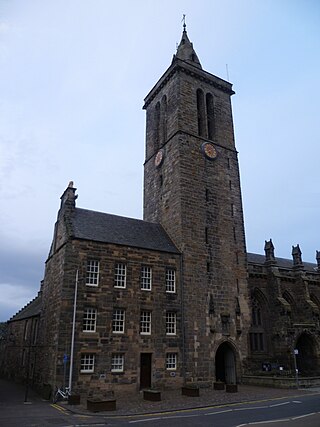Related Research Articles

Year 1047 (MXLVII) was a common year starting on Thursday of the Julian calendar.
Boydell & Brewer is an academic press based in Martlesham, Suffolk, England, that specializes in publishing historical and critical works. In addition to British and general history, the company publishes three series devoted to studies, editions, and translations of material related to the Arthurian legend. There are also series that publish studies in medieval German and French literature, Spanish theatre, early English texts, musicology, archaeology, and other subjects. Depending on the subject, its books are assigned to one of several imprints in Woodbridge, Suffolk, in Cambridge (UK), or in Rochester, New York, location of its principal North American office. Imprints include Boydell & Brewer, D. S. Brewer, Camden House, the Hispanic series Tamesis Books, the University of Rochester Press, James Currey, and York Medieval Press.
Ashgate Publishing was an academic book and journal publisher based in Farnham. It was established in 1967 and specialised in the social sciences, arts, humanities and professional practice. It had an American office in Burlington, Vermont, and another British office in London. It is now a subsidiary of Informa.
Anne Elizabeth Curry is an English historian and Officer of Arms.
John Bennett Gillingham is Emeritus Professor of Medieval History at the London School of Economics and Political Science. On 19 July 2007 he was elected a Fellow of the British Academy.
Ralph Warren Victor Elliott, was a German-born Australian professor of English, and a runologist.
The International Society for the Study of Medievalism is an academic organization that exists to promote the interdisciplinary study of the popular and scholarly reception of the Middle Ages in postmedieval times. The Society is based on the work and studies of Leslie J. Workman (1927–2001), who is recognized as formalising the academic study of medievalism in the English-speaking world. Katheen Verduin collaborated with Workman for nearly 20 years to establish the Society and its peer-reviewed journal, Studies in Medievalism (SiM).
The Scottish Text Society (STS) is a text publication society founded in 1882 to promote the study of Scottish literature. The Society publishes scholarly editions of important texts from the country's literary history, and has played a significant role in the revival of interest in the literature and languages of Scotland.

Education in Medieval Scotland includes all forms of education within the modern borders of Scotland, between the departure of the Romans from Britain in the fifth century, until the establishment of the Renaissance late fifteenth century and early sixteenth century. Few sources on Scottish education survived the Medieval era. In the early Middle Ages, Scotland was an oral society, with verbal rather than literary education. Though there are indications of a Gaelic education system similar to that of Ireland, few details are known. The establishment of Christianity from the sixth century brought Latin to Scotland as a scholarly and written language. Monasteries served as major repositories of knowledge and education, often running schools.
Katie Stevenson is Dean of the Faculty of Arts, and a professor of history, at Monash University. She is former Vice-Principal at the University of St Andrews, Keeper of Scottish History and Archaeology at National Museums Scotland, and former director of the Institute of Scottish Historical Research at the University of St Andrews. She has written several books on medieval Scotland including the New History of Scotland book, Power and Propaganda, Scotland 1306-1488 at Edinburgh University Press. In 2014 she was awarded a research medal for the Humanities and Creative Arts from the Royal Society of Edinburgh. She won the Maclehose-Dickinson Essay Prize for 2003. Stevenson has presented radio, television and podcasts about medieval Scotland, and contributed to the London Review of Books. She is on the editorial board of Cogent OA Arts and Humanities.

Christopher Harper-Bill was a British historian who was a professor of history at the University of East Anglia. He had previously taught Medieval History at St. Mary's University College (Twickenham). Harper-Bill's research interests were "the ecclesiastical history of England from the Norman Conquest to the eve of the Reformation, and particularly in the edition of episcopal and monastic records." Harper-Bill was completing a four-volume edition of the acta of the bishops of Norwich from 1070 to 1299.
Graham Anthony Loud is a professor emeritus of medieval history at the University of Leeds. Loud is a specialist in the history of southern Italy during the Central Middle Ages, and also in German history in the Staufen period.
Frances Elizabeth Andrews is a British historian who is professor of medieval history at the University of St Andrews. She is a specialist in the medieval church and its networks.
The Medieval Mediterranean is a peer-reviewed history book series published by Brill on the medieval history of the Mediterranean area. The managing editor is Frances Andrews of St Andrews University. The series published approximately three books each year and had published 107 volumes as of November 2016.
Christopher J. Tyerman is a British academic and historian focusing on the Crusades. In 2015, he was appointed Professor of History of the Crusades at the University of Oxford.
Laura Ashe FRHistS is a British historian of English medieval literature, history and culture. She is Professor of English Literature at the University of Oxford and Fellow and Tutor in English Literature at Worcester College.
Alastair J. Minnis is a Northern Irish literary critic and historian of ideas who has written extensively about medieval literature, and contributed substantially to the study of late-medieval theology and philosophy. Having gained a first-class B.A. degree at the Queen's University of Belfast, he matriculated at Keble College, Oxford as a visiting graduate student, where he completed work on his Belfast Ph.D., having been mentored by M.B. Parkes and Beryl Smalley. Following appointments at the Queen's University of Belfast and Bristol University, he was appointed Professor of Medieval Literature at the University of York; also Director of the Centre for Medieval Studies and later Head of English & Related Literature. From 2003 to 2006, he was a Humanities Distinguished Professor at Ohio State University, Columbus, from where he moved to Yale University. In 2008, he was named Douglas Tracy Smith Professor of English at Yale.
Keir Waddington is professor of history at Cardiff University. He is a specialist in medical, urban, and environmental history. He is the joint editor of the Social Histories of Medicine monograph series. He previously held a post at the Wellcome Centre for the History of Medicine, working with Roy Porter on The History of Bethlehem, and had a fellowship at St Bartholomew's Hospital.
Chris Given-Wilson is a British historian and academic, specialising in medieval history. He was Professor of History of the University of St Andrews, where he is now professor emeritus. He is the author of a number of books.
Ann Julia Kettle is a historian and Honorary Senior Lecturer at the University of St Andrews.
References
- ↑ Professor Frances Andrews. University of St Andrews School of History. Retrieved 3 November 2016.
- ↑ Studies in the History of Medieval Religion. Boydell & Brewer. Retrieved 3 November 2016.